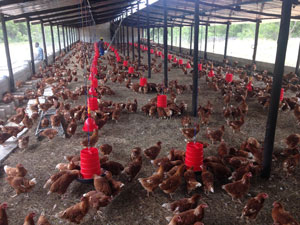CHIWUNDURA, Zimbabwe—A Southern Baptist missionary from Kentucky is hatching a plan to help pastors in Zimbabwe get the training they need to lead a new generation Christians.
Nick Moore, who serves as a professor at the Baptist Theological Seminary of Zimbabwe, said few future pastors can afford to attend Bible classes because of the country’s oppressive unemployment and inflation rates. But with help through the Cooperative Program—the Southern Baptist Convention’s channel for supporting missions and ministry—and some handy Kentucky Baptists, Moore thinks he’s found the answer.
Chicken eggs.
Seminary students, with the help of a few local laborers, have started building chicken houses in a community called Chiwundura as part of a community development project. Plans are to build a network of structures capable of housing thousands of chickens and later harvesting eggs for market.
“We didn’t want to just swoop in with money to ‘fix’ the problem,” said Moore, who founded Redemption Hill Baptist Church in Taylorsville, Ky., where he used to serve as pastor. “Instead, we wanted to provide a long-term, sustainable solution.”

Nick Moore/IMB
The first of 9,000 Hyline laying hens check out the new roost near the Baptist Theological Seminary of Zimbabwe where students will work part time to pay for tuition, room and board while in school. The business venture has the dual benefit of financially supporting students and giving them skills that can be used after graduation to supplement their pastor income.
Zimbabwe’s economy has floundered since former President Robert Mugabe started ordering governmental land seizures in 2000. The often violent land redistribution program stripped nearly 4,000 white farmers of farmlands and threatened to evict black farmers who cooperated with whites as partners or managers.
The result was an immediate shortage of food followed by years of bad harvests and an extended dry spell. Zimbabwe, once the breadbasket of Africa, began suffering from the country’s worst famine in more than 60 years.
Unemployment soared, public services collapsed and the economy shrank. But Zimbabwe’s new president, Emmerson Mnangagwa, has vowed to improve the economy and said the country now “open for business,” according to a Jan. 24 CNN report.
One area that did reportedly grow while Mugabe was president was belief in Jesus Christ.
The U.S. Department of State estimates that as much as 80 percent of Zimbabweans identify themselves as Christian and the fastest growing group appear to be evangelicals.
To help lead all those new believers in what it means to follow Christ, the International Mission Board sent Moore with the goal of helping to revitalize the seminary. Since 2015, he has worked as a professor and ministers in the south Africa country with his wife Kyndra and their seven children.
When the Moore family arrived, there were 15 students attending the seminary and only 3 of them were able to cover tuition because of sponsorships outside the country.
Through the community development project, he said, “our students will be able to finance their education through their own hard work while also learning the ins and outs of the poultry trade, which will serve as a useful skill set when they eventually become bi-vocational pastors, church planters and missionaries.”
Moore said when the business is fully operational, he expects to have 9,000 eggs per day to fill the shortage in local supermarkets. The first batch of 2,500 laying hens arrived at Umambo Farms last week and soon will be followed with more shipments. Umambo in the Shona language means “kingdom.”
“Kentucky Baptist churches have some unique opportunities to help advance the Gospel there,” said Kentucky Baptist Convention missions strategist Doug Williams.
Mission teams are needed to not only work alongside students, but minister to the smattering of local laborers who have been hired to build a second large poultry house near the seminary. Williams said plans are to build about 20 smaller structures throughout Chiwundura so that individual households can create their own small businesses, and thus spur the local economy.
“In each of these homes is another potential opening to share the love of Jesus,” Williams said.
Williams said church teams can help with these and other ongoing outreach ministries in Zimbabwe, like discipling the staff at a new church plant about what it means to be a healthy church.
Moore and his wife have also been working with a group of 18 widows in establishing corn plots next to the seminary. Individuals with a farming background could pass on their knowledge to women who find themselves no longer under the financial security of a husband. There’s also a need for skilled and non-skilled volunteers to help upgrade seminary housing.
“We could certainly use the help,” Moore said.
For more information, contact the Kentucky Baptist Convention at info@kybaptist.org . (BP)
Robin Cornetet